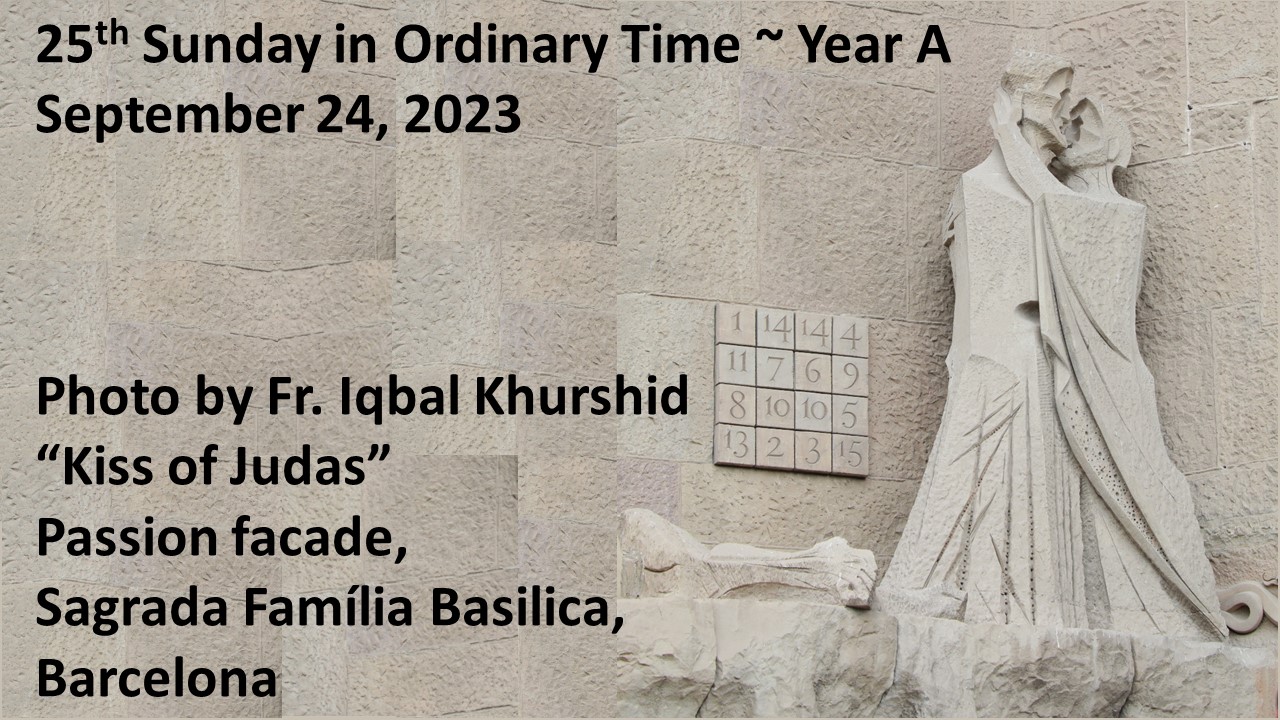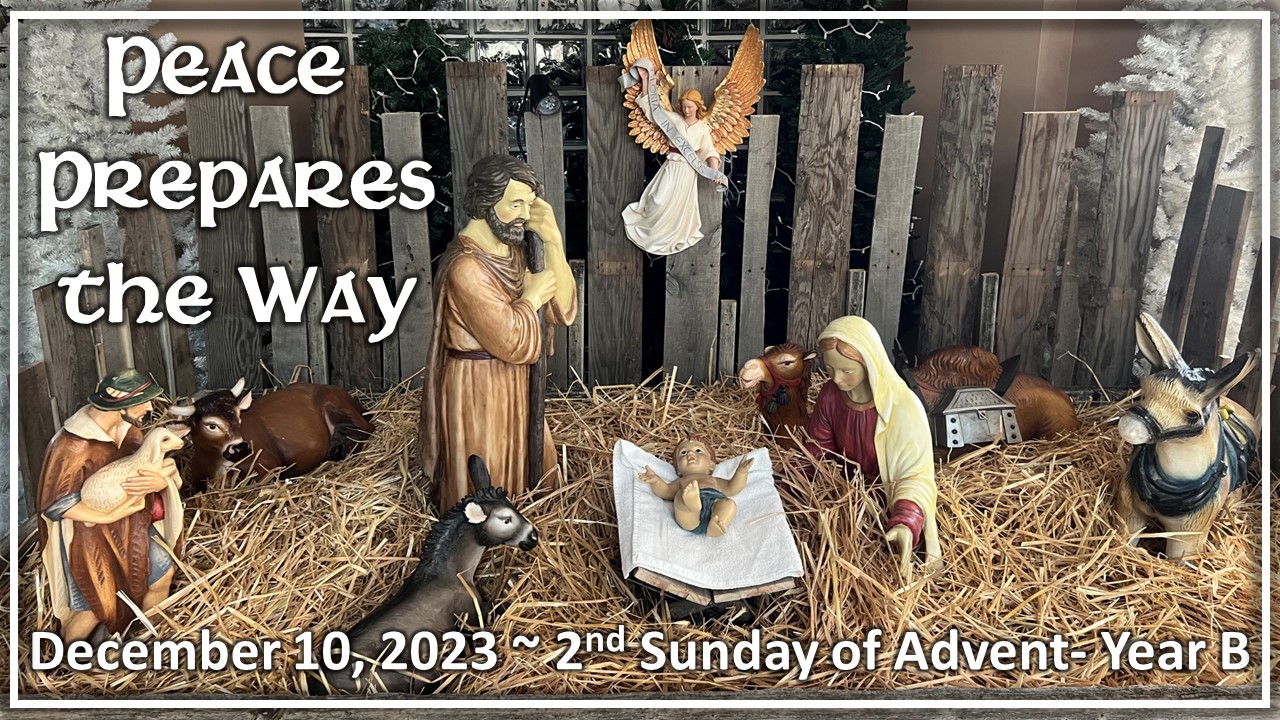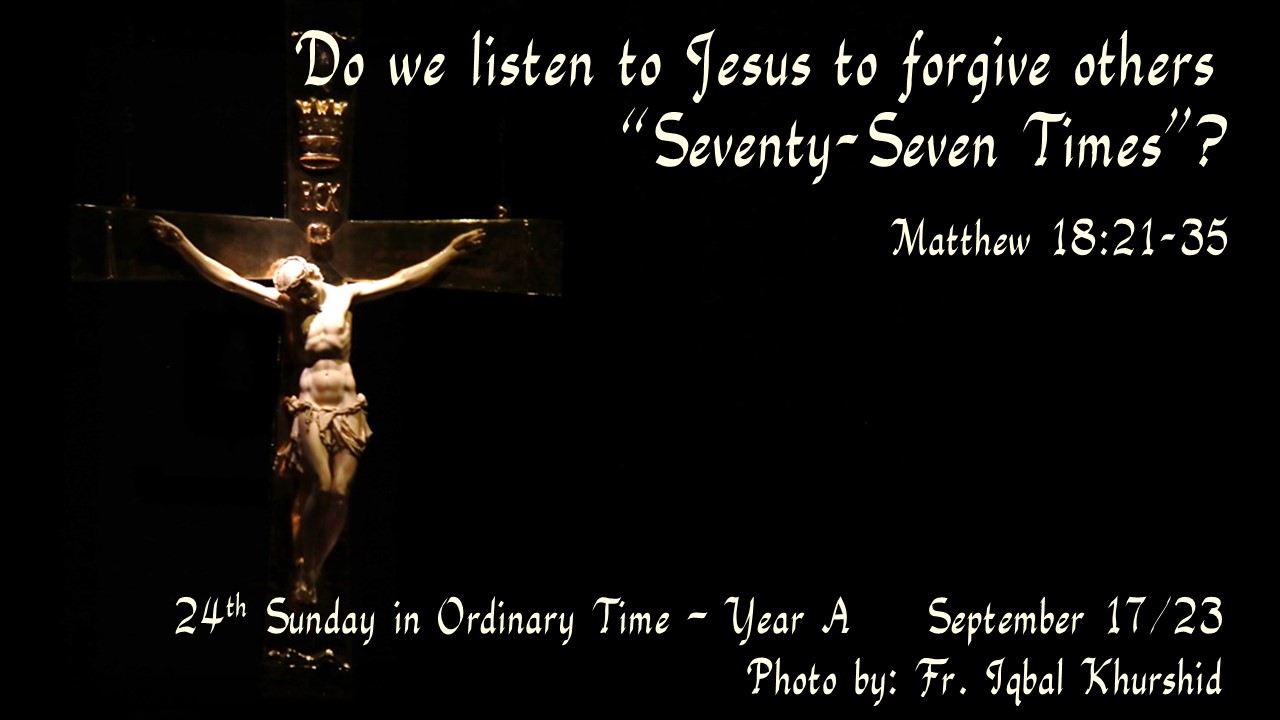
25th Sunday in Ordinary Time – Year A ~ September 24, 2023
A DIFFERENT WAY OF THINKING
Last Sunday we reflected on the element of forgiveness without limit. Today through the Scripture Readings the Lord is inviting us to examine our thinking and compare it with his ways of thinking. In our present time, during the Covid-19 pandemic, sadness runs deep in our world, especially for those who do not know what the future is going to bring for them. Human thinking is prevailing over trust in the Lord and fear of death is becoming bigger than the joy of life. People are questioning how long this situation is going to linger and no one has the answer. What should our reaction and thinking be? We do not need to be misled and deceived by any fear or human understanding, but we must be vigilant and smart enough to choose what is right for us by trusting in the Lord.
Let us take a few moments to reflect on the following story:
Many years ago, in a small Italian town, a merchant had the misfortune of owing a large sum of money to the moneylender. The moneylender, who was old and ugly, fancied the merchant’s beautiful daughter, so he proposed a bargain. He said he would forgo the merchant’s debt if he could marry the daughter. Both the merchant and his daughter were horrified by the proposal.
The moneylender told them that he would put a black pebble and a white pebble into an empty bag. The girl would then have to pick one pebble from the bag. If she picked the black pebble, she would become the moneylender’s wife and her father’s debt would be forgiven. If she picked the white pebble, she need not marry him, and her father’s debt would still be forgiven. But, if she refused to pick a pebble, her father would be thrown into jail.
They were standing on a pebble-strewn path in the merchant’s garden. As they talked, the moneylender bent over to pick up two pebbles. As he picked them up, the sharp-eyed girl noticed that he had picked up two black pebbles and put them into the bag. He then asked the girl to pick her pebble from the bag.
The girl put her hand into the bag and drew out a pebble. Without looking at it, she fumbled and let it fall onto the pebble-strewn path where it immediately became lost among all the other pebbles. “Oh, how clumsy of me,” she said. “But never mind, if you look into the bag for the one that is left, you will be able to tell which pebble I picked.”
I believe sometimes it is necessary to think beyond our human thinking by allowing God to work in our lives. In the First Reading the Prophet Isaiah brings two very important aspects of our faith: First, he encourages us to “Seek the Lord while he may be found, call upon him while he is near”. The whole Bible is full of examples of people who searched the Lord and they found him. In the New Testament some of Jesus’s disciples were curious to know and see him and Jesus told them “Come and See”. In our Christian faith, everyday we are invited to seek the Lord and find him. Secondly, the Prophet Isaiah reminds that we must not compare our ways of thinking with God’s; “For my thoughts are not your thoughts, nor are your ways my ways, says the Lord. For as the heavens are higher than the earth, so are my ways higher than your ways and my thoughts than your thoughts”.
Human thinking is made up primarily of limitation, imperfection, bondage, and ignorance. This thinking wants to remain here on earth. It gets joy in the finite: in family, in society, in earthly affairs. Human consciousness makes us feel that we can exist without God. When it is in deep ignorance, human consciousness feels that there is no necessity for God. We see millions and billions of people who do not pray or meditate. They feel, “If God exists, well and good; if He does not exist, we don’t lose anything.” Although they may use the term ‘God’ in season and out of season, they do not care for the reality, the existence of God either in Heaven or in their day-to-day earthly lives. Human consciousness feels there is nothing more important than earthly pleasure. Human consciousness tries to convince us that we are nowhere near Truth or Fulfilment. It tries to make us feel that God is somewhere else, millions of miles away from us.
However, on the other hand the Divine thinking is made up of Peace, Bliss, divine Power and so forth. Its nature is to expand constantly. Divine consciousness feels there is nothing more important and significant than heavenly Joy and Bliss on earth. The Divine consciousness makes us feel that God is right here, inside each life-breath, inside each heartbeat, inside everyone and everything around us. It makes us feel that we are on earth precisely because He exists. And when we cherish divine thoughts, the divine consciousness makes us feel it is He who is inspiring us to cherish these divine ideas. In everything the divine consciousness makes us feel that there is a divine purpose, divine aim, divine ideal, divine goal.
Our Holy Father Pope Francis reflecting on the Gospel says “in the Gospel today there is the parable of the day labourers in the vineyard, which Jesus recounts in order to explain two aspects of the Kingdom of God: the first is that God wants to call everyone to work for his Kingdom; the second is that, in the end, he wants to give everyone the same reward, that is, salvation, eternal life. The owner of the vineyard who represents God, goes out at dawn, and hires a group of workers, agreeing with them on the day’s wages. It was a fair wage. Then he goes out again several times later in the day — he goes out five times that day — until the late afternoon to hire other unemployed labourers whom he sees. At the end of the day, the landowner orders that a denarius be paid to everyone, even to those who had only worked for a few hours. Naturally, the labourers who were hired first complained because they see that they were paid as much as those who worked for fewer hours. The landowner, however, reminds them about what had been agreed upon; if he then wants to be generous with the others, they should not be envious”.
Further, he explains the parable in this way: “With this parable, Jesus wants to open our hearts to the logic of the Father’s love which is free and generous. It is about allowing oneself to be astonished and fascinated by the “thoughts” and the “ways” of God which, as the Prophet Isaiah recalls, are not our thoughts and not our ways. Human thoughts are often marked by selfishness and personal advantages, and our narrow and contorted paths are not comparable to the wide and straight streets of the Lord. He uses mercy — do not forget this: He uses mercy —, he forgives broadly, filled with generosity and kindness which he pours forth on each of us. He opens for everyone the boundless territory of his love and his grace, which alone can give the human heart the fullness of joy”.
There is no doubt that sometimes our human thinking becomes stronger than the Divine because we fall into the trap of this world which says “there is no God” but must allow Divine power to work within us and I guess the result will be the following:
There was a young woman who took great pride in the growth and care of the flowers in her flower garden. She had been raised by her grandmother who taught her to love and care for the flowers as she herself had done. So, like her grandmother, her flower garden was second to none.
One day while looking through a flower catalogue she often ordered from, a picture of a plant immediately caught her eye. She had never seen blooms on a flower like that before. “I have to have it,” she said to herself, and she immediately ordered it.
When it arrived, she already had a place prepared to plant it. She planted it at the base of a stone wall at the back of her yard. It grew vigorously, with beautiful green leaves all over it, but there were no blooms. Day after day she continued to cultivate it, water it, feed it, and she even talked to it attempting to coax it to bloom. But to no avail.
One morning weeks later, as she stood before the vine, she contemplated how disappointed she was that her plant had not bloomed. She was giving considerable thought to cutting it down and planting something else in its place.
It was at this point that her invalid neighbor, whose lot joined hers, called over to her. “Thank you so much! You can’t imagine how much I have enjoyed the blooms of that vine you planted.” The young woman walked through the gate into her neighbor’s yard, and sure enough, she saw that on the other side of the wall the vine was filled with blooms.
These were indeed the most beautiful blooms she had ever seen. The vine had crept through the crevices and as it had not flowered on her side of the fence, it had flowered luxuriantly on the other side.
Just because you cannot see the good result of your labour does not mean that it bore no fruit. It is the same with not seeing God with our human eyes, but that does not mean that he does not exist.
Jesus wants to make us contemplate the gaze of that landowner: the gaze with which he looks upon each of the labourers searching for work and calls them to go to his vineyard. It is a gaze which is filled with attention and kindness. It is a gaze which calls, invites one to get up and begin a journey because he wants life for each of us; he wants a full, committed life, safe from emptiness and inertia. God excludes no one and wants each of us to achieve his or her fullness. This is the love of our God, of our God who is Father. Jesus said “Here I am! I stand at the door and knock. If anyone hears my voice and opens the door, I will come in and eat with that person, and they with me”.
May Mary Most Holy help us welcome into our lives the logic of love which frees us from the presumption of deserving God’s reward and from the critical judgement of others and allowing God’s divine power to work within us.
Other Sermons In This Series

2nd Sunday of Advent- Year B ~ December 10, 2023
December 07, 2023

Solemnity of Pentecost, Year C ~ June 5, 2022
June 03, 2022

24th Sunday in Ordinary Time – Year A ~ September 17, 2023
September 13, 2023

